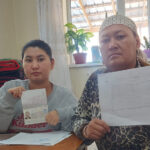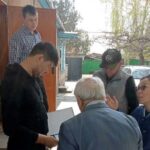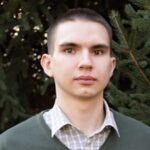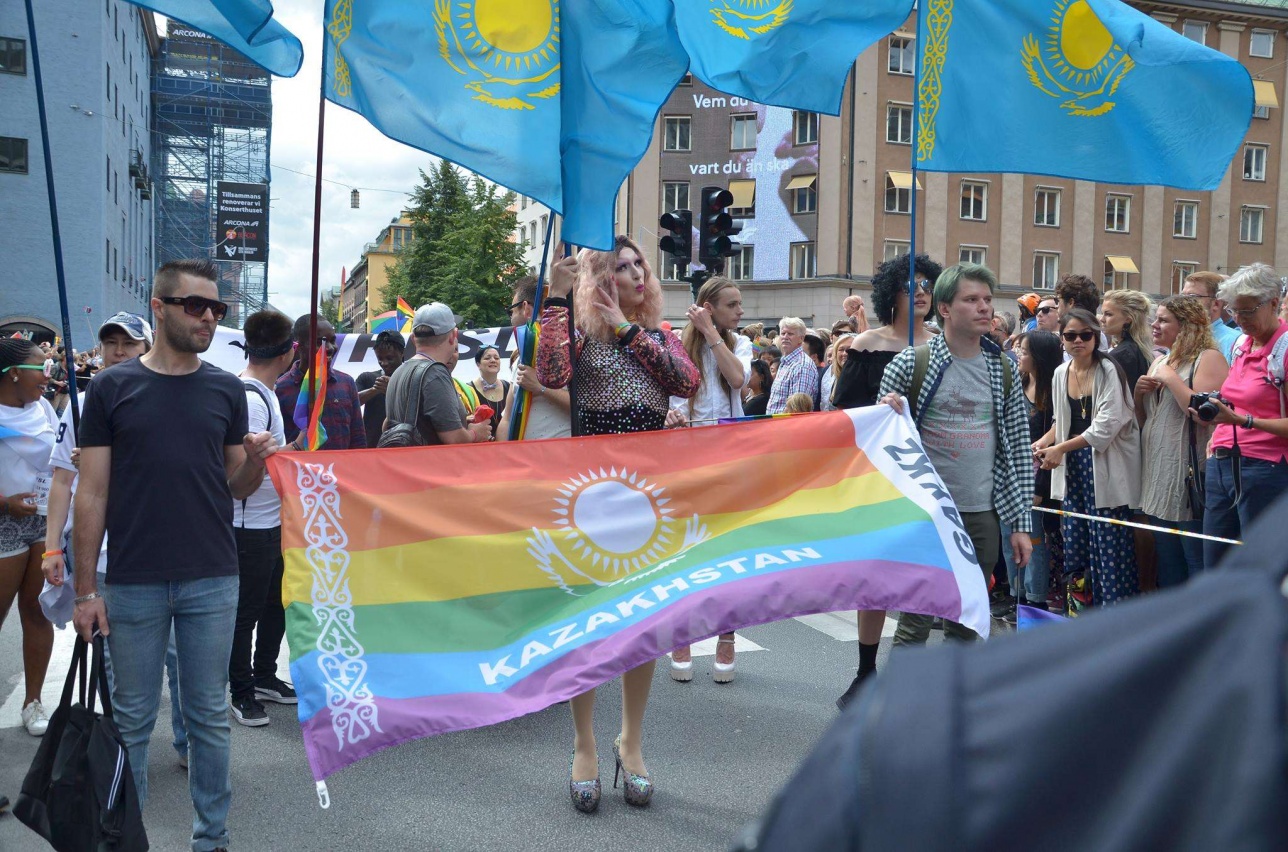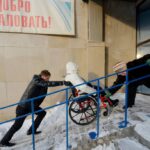A Baptist in Semey in
A 19-year-old Baptist in Semey [formerly
Kandyba and Leonov, like other Council of Churches Baptists, have adopted a policy of civil disobedience, refusing to pay fines imposed for meeting for worship without compulsory state registration. Council of Churches Baptists think such fines are wrong, as neither Kazakhstan’s Constitution nor the country’s international human rights obligations allow punishments for exercising human rights without state permission.
In 2013 alone, more than 150 people including Kandyba and Leonov are known to have been fined for exercising freedom of religion or belief without state permission (see F18News 11 November 2013 http://www.forum18.org/archive.php?article_id=1895). Kandyba and Leonov are – like others who refuse to be fined for exercising their human rights – already on the list of those banned from leaving
Numerous similar fines continue to be imposed. Kandyba’s and Leonov’s prison terms are the third and fourth known jailings in 2014 for refusal to pay fines imposed for exercising the right to freedom of religion or belief. Two fellow Baptists, Vyacheslav Cherkasov and Zhasulan Alzhanov, were each sentenced to 48-hour prison terms in Akmola Region on 9 January (see F18News 14 January 2014 http://www.forum18.org/archive.php?article_id=1915).
Pastor’s criminal trial due to resume tomorrow
Meanwhile, the criminal trial of retired Presbyterian pastor Bakhytzhan Kashkumbayev in the capital Astana is due to resume tomorrow morning (29 January). Further hearings are scheduled for 30 and 31 January, according to the court website. The 67-year-old retired pastor is accused of “harming health” and “inciting hatred”, charges he and his Grace Church vigorously reject (see F18News 22 January 2014 http://www.forum18.org/archive.php?article_id=1918). However, prosecutors withdrew charges of propagating “extremism” and leading an organisation that harms others on the first day of his trial on 22 January.
UN Special Rapporteur on Freedom of Religion or Belief visit planned
Kazakhstan’s government has agreed to a visit to the country by the United Nations Special Rapporteur on Freedom of Religion or Belief, Heiner Bielefeldt, “during the first quarter of 2014”, the Special Rapporteur noted in his 26 December 2013 report (A/HRC/25/58) to the UN Human Rights Council (see http://www.ohchr.org/EN/HRBodies/HRC/RegularSessions/Session25/Documents/A-HRC-25-58_en.doc).
“He does not consider himself guilty”
Kandyba, a third year technology student, was among 11 members of his Baptist church fined for exercising the right to freedom of religion or belief in 2013 (see F18News 11 November 2013 http://www.forum18.org/archive.php?article_id=1895).
Kandyba was found guilty on 6 June 2013 at
On 3 July 2013 East
Prosecutors then launched a case under Administrative Code Article 524 (“Failure to carry out court decisions”). This carries a punishment on individuals of up to 10 MFIs or up to 10 days’ administrative arrest.
At his trial on 20 January 2014 at
“Social danger”
The Judge considered the maximum punishment was necessary “in view of the social danger of the given offence, its deliberate character and the personality of the offender, who did not recognise his guilt, did not repent of it, and openly admits that he ignores court decisions”.
Aynura Shaimukhambetova of the Prosecutor’s Office, who led the prosecution case in court, defended her actions. “Kandyba hadn’t paid the fine,” she insisted to Forum 18 from Semey on 28 January. “He violated the Religion Law.” She rejected Forum 18’s observation that Kandyba’s right to practice his faith freely is protected by
The Religion Law is part of systemic Kazakh government violation of freedom of religion or belief and other human rights, being one of two laws breaking the country’s human rights obligations which came into force in October
Another punishment?
On 14 January, prosecutors brought a similar case under Article 524 against fellow-church member Sergei Kulikov, punished with the same penalty as Kandyba on the same day in 2013 (see F18News 11 November 2013 http://www.forum18.org/archive.php?article_id=1895). However, when Kulikov’s case reached
3-day imprisonment
On 20 January, the same day that Kandyba was imprisoned, fellow Council of Churches Baptist Leonov was sentenced to a three-day prison term. Judge Bakdarly Orazbek at Ayagoz District Court in East Kazakhstan Region similarly found him guilty of violating Administrative Code Article 524, according to the court decision seen by Forum 18.
Leonov had refused to pay a fine of 100 MFIs handed down on 4 March 2013 by Ayagoz District Court under Article 374-1, Part 1.
“In November 2013 Leonov was told verbally that the criminal case would be closed and he would be informed in writing of this,” Council of Churches Baptists told Forum 18. “However, so far he hasn’t received anything.”
Seven more fines to come?
At least seven members of the Semey Council of Churches Baptist congregation also face administrative prosecution in a series of cases launched after a would-be visitor to the congregation’s meeting for worship on 8 December 2013 lodged complaints to police that five named church members were preaching “extremism”. The individual, who church members say is registered as an out-patient at a psychiatric facility and had been among those fined in 2013, was denied entry after disrupting earlier church services, church members told Forum 18.
A local police officer and an official of the Emergency Situations Ministry were called to the service. After the five church members wrote statements, the police officer left. However, he arrived again a week later, and demanded statements from five more church members.
On 13 January 2014, the local police officer handed these church members notifications that administrative cases had been opened against each of them by Semey Prosecutor’s Office. All five were charged under Administrative Code Article 374-1, Part 2 (“Participation in the activity of an unregistered, halted, or banned religious community or social organisation”) – the same “offence” Kandyba was originally convicted of.
The first case to reach court was that of Yelena Dyachenko. However, on 24 January Judge Amanbai Aldiyarov of
Cases against church leader Viktor Kandyba (Maksim Kandyba’s father), Nailya Zhevagina, Igor Kunitsyn, Viktor Gordeyev, Vadim Gritsai and Anatoly Stakhnev reached court on 16 and 17 January, according to court records seen by Forum 18. No dates for hearings have yet been set.
Nerzhan Aurbakirov of Semey Prosecutor’s Office defended the new court cases. He refused to explain what church members had done wrong. “Courts take decisions, and if they don’t agree with any court decisions they can appeal,” he insisted to Forum 18 on 28 January. He then put the phone down.
“Missionary activity and agitation” fines
Jehovah’s Witnesses continue to be fined for talking to other people on the streets or at people’s doors about their faith. Most are punished under Administrative Code Article 375, Part 3 (“The carrying out of missionary activity by citizens of the Republic of Kazakhstan, foreigners and persons without citizenship without registration (re-registration), as well as the use by missionaries of religious literature, informational materials of religious content or objects of religious significance without a positive assessment of a religious studies expert analysis”).
After a five minute conversation with one resident and a ten-minute conversation with another in Petropavl [Petropavlovsk] in North Kazakhstan Region on 12 November
Bolat Omarov, chief specialist at the Religious Affairs Department of North Kazakhstan Regional Akimat (administration), brought prosecutions against the two. On 30 December 2013, Judge Aslambek Koshenov of
Musakulov of the police Department for the Struggle with Extremism told
Tokarev’s case was finally heard at
Forum 18 was unable to reach Musakulov at the Department for the Struggle with Extremism in Petropavl. His superior officer – who would not give his name – said on 28 January that Musakulov was not in the office. He totally refused to explain why Musakulov thought Semyonova and Tokarev were “extremists” who should be detained and prosecuted.
Fines, fines
Other cases have been brought recently against Jehovah’s Witnesses under Administrative Code Article 375, Part 3:
Orynkul Tleuzhanova was fined 100 MFIs by Judge Darkhan Kentbayev at Aral District Court on 15 November 2013. Her appeal was rejected on 5 December 2013 by the southern Kyzylorda [Qyzylorda]
Mikhail Tsurkan and Sergei Kucherin had administrative cases launched against them in Kurchatov in East Kazakhstan Region on 30 December 2013.
Gulsuna Kadenova and Akmaral Serikova had administrative cases launched against them in Oskemen in East Kazakhstan Region on 10 January 2014. The cases were handed to
Threats, interrogations
Meanwhile, members of
Many religious communities complained of what they variously described as the Religion Law’s “complex”, “burdensome”, “arbitrary”, “unnecessary” and “expensive” compulsory re-registration process – which broke Kazakhstan’s international human rights obligations (see F18News 21 November 2012 http://www.forum18.org/archive.php?article_id=1768).
On 2 December 2013 two church members were summoned to the Akimat. One works for the prison service, the other for a state educational institution. All 52 signatories to the re-registration application seem to have been later summoned to Daryn Zhapabayev, one of Arkalyk’s Deputy Prosecutors, or Arkalyk’s Deputy Akim, Yeslambek Mametekov.
“Our church members were questioned as to why they joined the church, why they attend and why they signed the re-registration application,” Pastor Fedoskin complained to Forum 18. “They were pressured to sign pre-prepared statements that they had not understood what they were signing.”
At at least two of the interrogations at the Prosecutor’s Office, church members’ superiors from their workplace were also present.
After the initial pressure to sign statements, Pastor Fedoskin complained and called on prosecutors to halt the pressure. “The situation went quiet, but restarted in early January,” he told Forum 18.
Pastor Fedoskin said he does not know how many of the 2012 re-registration application signatories have withdrawn their signatures on the re-registration application. He fears that if the number goes below the required 50 for applications, the authorities may begin moves to strip the congregation of state registration. Without such registration, any activity the congregation undertakes would be illegal.
Arkalyk’s Prosecutor, Turar Zhusipov, earlier lodged a suit to
“Prosecutors have already told me the Justice Department is checking the legality of the congregation’s registration, but the Justice Department has not contacted me,” Pastor Fedoskin told Forum 18.
KNB secret police surveillance
On 8 December
All religious communities are thought to be under surveillance by the ordinary police and KNB secret police (see eg. F18News 29 February 2012 http://www.forum18.org/Archive.php?article_id=1673). Many communities are reluctant to discuss this – including KNB attempts to recruit informers – for fear of state reprisals. There have also been apparent attempts to smear or blackmail members of some religious communities (see F18News 16 April 2013 http://www.forum18.org/archive.php?article_id=1825).
“No threats”
Deputy Prosecutor Zhapabayev claimed to Forum 18 on 24 January that “no threats” had been used against New Life church members. However, he totally refused to say how many church members had been interrogated, or what he thinks they have done wrong. He then put the phone down.
Despite repeated calls on 28 January, Forum 18 was unable to reach Deputy Akim Mametekov. His assistant said he was out of the office at a meeting.
SOURCE:
Forum18
http://forum18.org/archive.php?article_id=1921

